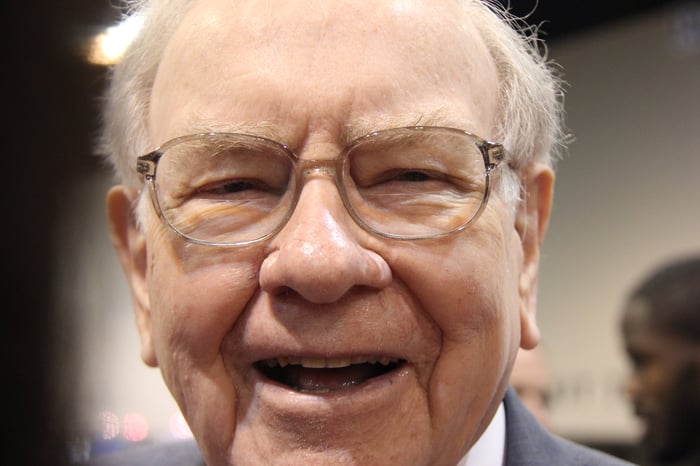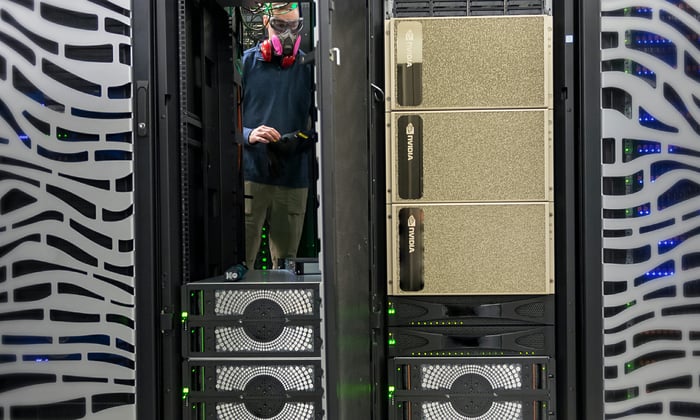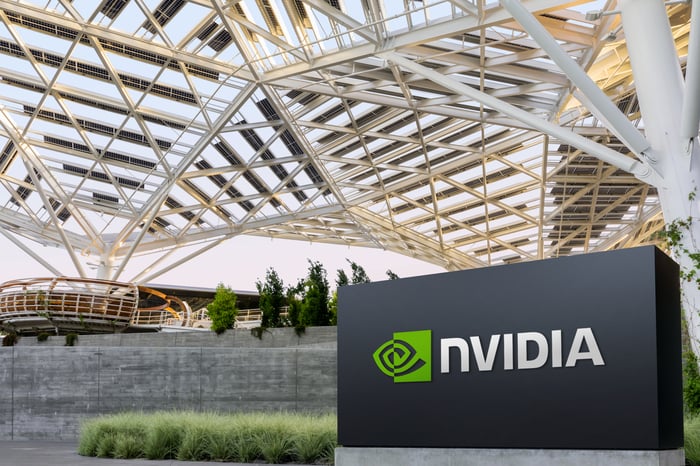You may not realize it, but last week marked one of the most important data releases of the quarter for investors — and I’m not talking about the highly anticipated April inflation report.
May 15 was the deadline for institutional money managers with at least $100 million in assets under management to file Form 13F with the Securities and Exchange Commission. A 13F allows investors to look over the proverbial shoulders of Wall Street’s greatest investors to see what they were buying and selling in the latest quarter (in this instance, the quarter ended in March).
Since the “Magnificent Seven” stocks have been credited with pushing the broad-market indexes to record highs, it’s only logical to examine how Wall Street’s smartest billionaire investors approached these companies in the first quarter.

Image source: Getty Images.
When I say Magnificent Seven, I’m talking about seven of the largest and most-influential businesses in the country today, including:
What these stocks share in common is a massive outperformance of the benchmark S&P 500 over the trailing-10-year period, along with well-defined competitive advantages. For instance, Alphabet’s Google has maintained at least a 90% monthly share of global internet search dating back nine years. Meanwhile, Apple has the most robust capital-return program on the planet among publicly traded companies. Since initiating a buyback program in 2013, it’s repurchased $674 billion of its own stock. Buybacks of this magnitude can provide a hearty lift to earnings per share.
However, billionaires have very different outlooks for these seven stocks. Based on the latest round of 13Fs, billionaires dumped shares of two Magnificent Seven stocks, while absolutely piling into another.
Magnificent Seven stock No. 1 billionaires sent to the chopping block: Nvidia
The first member of the Magnificent Seven that prominent billionaire investors seemingly wanted nothing to do with in the first quarter is the infrastructure backbone of the artificial intelligence (AI) revolution, Nvidia. Just as we witnessed during the fourth quarter, eight well-known billionaires were sellers, including (total shares sold in parenthesis):
- Philippe Laffont of Coatue Management (2,937,060 shares)
- Ken Griffin of Citadel Advisors (2,462,716 shares)
- Israel Englander of Millennium Management (720,004 shares)
- Stanley Druckenmiller of Duquesne Family Office (441,551 shares)
- David Siegel and John Overdeck of Two Sigma Investments (420,801 shares)
- David Tepper of Appaloosa Management (348,000 shares)
- Steven Cohen of Point72 Asset Management (304,505 shares)
Why would billionaires sell what’s arguably been the hottest megacap stock on Wall Street? Aside from simple profit-taking, there are a few potential red flags that Wall Street’s brightest investors may be focusing on.
To begin with, Nvidia is set to face increased competition from all angles. Although it’s well publicized that external competitors will be vying for graphics processing unit (GPU) market share in AI-accelerated data centers this year, the bigger threat may come from Nvidia’s own top customers.
Interestingly, Magnificent Seven components Microsoft, Meta Platforms, Amazon, and Alphabet are Nvidia’s four top customers — about 40% of net sales. Each of these companies is developing their own AI-GPUs to deploy in collaboration with Nvidia’s H100 GPUs in their high-compute data centers. The internal development of AI-GPUs from other Magnificent Seven businesses strongly suggests that we’re witnessing a peak in orders for Nvidia’s chips.
History has also been incredibly unkind to next-big-thing investment trends. Over the last three decades, there hasn’t been a buzzy innovation or trend that didn’t undergo a bubble-bursting event fairly early into its existence. Investors commonly overestimate the uptake and enterprise adoption of new technologies, which leads to bubbles. If the artificial intelligence bubble were to follow history and burst, no company would be hit harder than Nvidia, which saw its sales more than double last year because of AI-GPU demand.
Magnificent Seven stock No. 2 billionaires showed to the door: Meta Platforms
The second surprising Magnificent Seven stock that billionaires were casting aside during the quarter ended in March is social media juggernaut Meta Platforms. Nine successful billionaires — or 10, if you include the recently passed Jim Simons of Renaissance Technologies — were sellers of Meta stock, including (total shares sold in parenthesis):
- Ole Andreas Halvorsen of Viking Global Investors (2,259,650 shares)
- Philippe Laffont of Coatue Management (1,313,528 shares)
- Ken Griffin of Citadel Advisors (1,164,151 shares)
- Steven Cohen of Point72 Asset Management (779,637 shares)
- Stephen Mandel of Lone Pine Capital (735,911 shares)
- David Tepper of Appaloosa Management (727,500 shares)
- David Siegel and John Overdeck of Two Sigma Investments (175,614 shares)
- Terry Smith of Fundsmith (29,157 shares)
The top reason behind this selling was very likely profit-taking. Since hitting its bear market low in 2022, shares of Meta had gained close to 500%.
Billionaires may also have been leery about Meta’s somewhat unpredictable capital expenditure forecasts. Shares came under pressure in 2022 because of CEO Mark Zuckerberg’s desire to spend on the metaverse and augmented/virtual reality innovations. They began rallying in a big way last year when spending forecasts were reined in a bit. But based on Meta’s 2024 guidance, it appears as if Zuckerberg and his team are willing to aggressively spend, once again, on AI and other innovations that may not have a sizable payoff for years to come.
The third possibility for this selling activity might be concern about the health of the U.S. economy. Meta generates nearly 98% of its sales from advertising, and ad spending is highly cyclical. The stock market is incredibly pricey at the moment, and a historic decline in M2 money supply — the first since the Great Depression — suggests a recession might occur in the not-too-distant future.
But unlike Nvidia, I believe billionaires will regret paring down their stakes in Meta. It owns the top social media assets worldwide (Facebook, WhatsApp, Instagram, Threads, and Facebook Messenger), and has been able to sustain strong ad pricing power in most economic climates. Meta remains one of the cheapest Magnificent Seven stocks, based on forward-year cash flow.

Image source: Getty Images.
The Magnificent Seven stock billionaire investors can’t stop buying: Amazon
While trading activity in the Magnificent Seven leaned decisively to the sell side with Nvidia and Meta, and was mixed with other constituents, the one member that billionaires absolutely couldn’t stop buying is e-commerce leader Amazon. Nine billionaire investors were willing buyers of Amazon stock during the first quarter, including (total shares purchased in parenthesis):
- Israel Englander of Millennium Management (2,390,755 shares)
- Ole Andreas Halvorsen of Viking Global Investors (1,972,702 shares)
- Chase Coleman of Tiger Global Management (1,438,600 shares)
- Jeff Yass of Susquehanna International (1,336,042 shares)
- Ray Dalio of Bridgewater Associates (1,047,891 shares)
- Dan Loeb of Third Point (900,000 shares)
- Ken Fisher of Fisher Asset Management (785,018 shares)
- Ken Griffin of Citadel Advisors (352,453 shares)
- Philippe Laffont of Coatue Management (241,514 shares)
Although Amazon is best-known for its world-leading online marketplace, the company generates the lion’s share of its operating income and cash flow from a couple of its faster-growing ancillary segments. It’s these ancillary operations that likely attracted billionaires to buy shares of Amazon hand over fist during the March-ended quarter.
Arguably no operating segment is more important than cloud infrastructure service platform Amazon Web Services (AWS). AWS is the world’s top cloud infrastructure service platform by spend, and is currently pacing more than $100 billion in annual run-rate sales. Best of all, cloud-service margins are significantly higher than online retail margins, which means AWS typically accounts for a majority of Amazon’s operating income.
Advertising services and subscription services are holding their own, as well, with sustained double-digit sales growth. Amazon draws more than 2 billion people to its site each month, which affords it exceptional ad-pricing power. Meanwhile, the company surpassed 200 million global Prime subscriptions in April 2021 and has likely added to this total since securing the exclusive streaming rights to Thursday Night Football.
The final selling point for billionaires might be Amazon’s valuation. Since Amazon reinvests most of its operating cash flow back into its business, cash flow is a far better valuation metric than the traditional price-to-earnings ratio. After spending the entirety of the 2010s at a multiple of 23 to 37 times year-end cash flow, Amazon can be purchased right now for just 12.4 times consensus cash flow for 2025.
Should you invest $1,000 in Nvidia right now?
Before you buy stock in Nvidia, consider this:
The Motley Fool Stock Advisor analyst team just identified what they believe are the 10 best stocks for investors to buy now… and Nvidia wasn’t one of them. The 10 stocks that made the cut could produce monster returns in the coming years.
Consider when Nvidia made this list on April 15, 2005… if you invested $1,000 at the time of our recommendation, you’d have $584,435!*
Stock Advisor provides investors with an easy-to-follow blueprint for success, including guidance on building a portfolio, regular updates from analysts, and two new stock picks each month. The Stock Advisor service has more than quadrupled the return of S&P 500 since 2002*.
See the 10 stocks »
*Stock Advisor returns as of May 13, 2024
Randi Zuckerberg, a former director of market development and spokeswoman for Facebook and sister to Meta Platforms CEO Mark Zuckerberg, is a member of The Motley Fool’s board of directors. Suzanne Frey, an executive at Alphabet, is a member of The Motley Fool’s board of directors. John Mackey, former CEO of Whole Foods Market, an Amazon subsidiary, is a member of The Motley Fool’s board of directors. Sean Williams has positions in Alphabet, Amazon, and Meta Platforms. The Motley Fool has positions in and recommends Alphabet, Amazon, Apple, Meta Platforms, Microsoft, Nvidia, and Tesla. The Motley Fool recommends the following options: long January 2026 $395 calls on Microsoft and short January 2026 $405 calls on Microsoft. The Motley Fool has a disclosure policy.
The views and opinions expressed herein are the views and opinions of the author and do not necessarily reflect those of Nasdaq, Inc.









